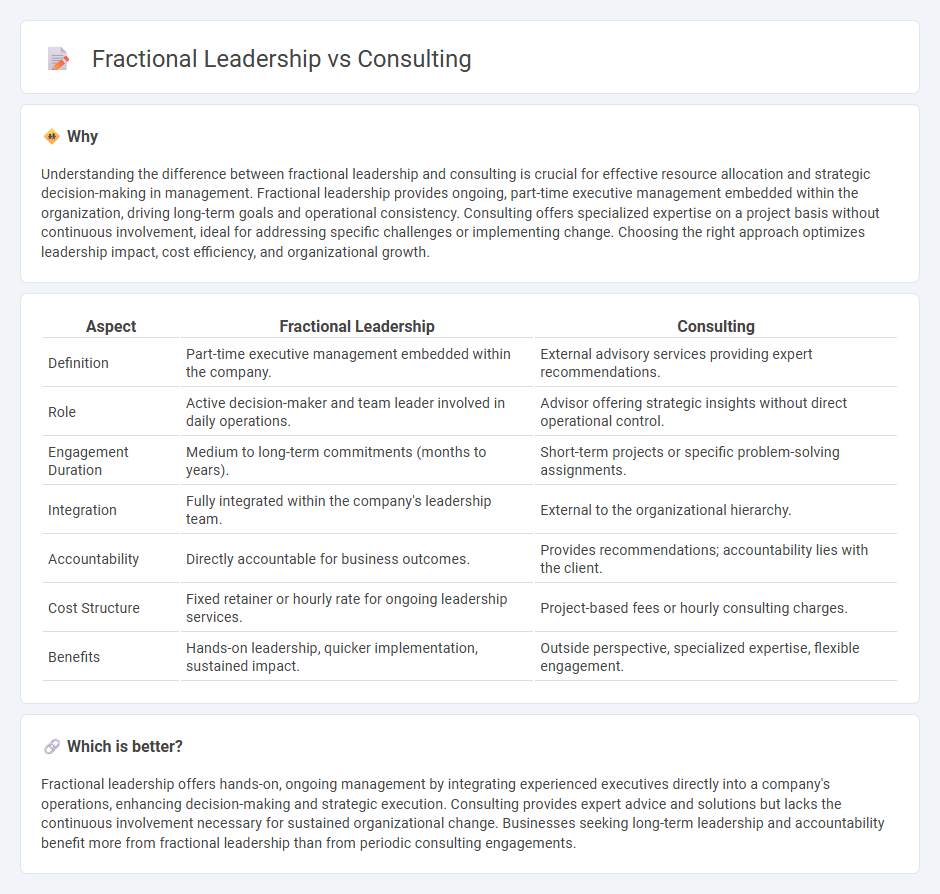
Fractional leadership offers organizations part-time executive expertise embedded within their teams, contrasting with consulting which typically provides external, project-based advice. This approach enables sustainable decision-making and ongoing leadership presence, while consulting focuses on problem-solving with a temporary scope. Explore the benefits of each model to determine the best fit for your business growth.
Why it is important
Understanding the difference between fractional leadership and consulting is crucial for effective resource allocation and strategic decision-making in management. Fractional leadership provides ongoing, part-time executive management embedded within the organization, driving long-term goals and operational consistency. Consulting offers specialized expertise on a project basis without continuous involvement, ideal for addressing specific challenges or implementing change. Choosing the right approach optimizes leadership impact, cost efficiency, and organizational growth.
Comparison Table
| Aspect | Fractional Leadership | Consulting |
|---|---|---|
| Definition | Part-time executive management embedded within the company. | External advisory services providing expert recommendations. |
| Role | Active decision-maker and team leader involved in daily operations. | Advisor offering strategic insights without direct operational control. |
| Engagement Duration | Medium to long-term commitments (months to years). | Short-term projects or specific problem-solving assignments. |
| Integration | Fully integrated within the company's leadership team. | External to the organizational hierarchy. |
| Accountability | Directly accountable for business outcomes. | Provides recommendations; accountability lies with the client. |
| Cost Structure | Fixed retainer or hourly rate for ongoing leadership services. | Project-based fees or hourly consulting charges. |
| Benefits | Hands-on leadership, quicker implementation, sustained impact. | Outside perspective, specialized expertise, flexible engagement. |
Which is better?
Fractional leadership offers hands-on, ongoing management by integrating experienced executives directly into a company's operations, enhancing decision-making and strategic execution. Consulting provides expert advice and solutions but lacks the continuous involvement necessary for sustained organizational change. Businesses seeking long-term leadership and accountability benefit more from fractional leadership than from periodic consulting engagements.
Connection
Fractional leadership and consulting intersect in providing strategic expertise to businesses without full-time commitment, allowing companies to access specialized skills cost-effectively. Fractional leaders function as part-time executives driving operational improvements, while consultants offer targeted advice and solutions, both focusing on enhancing organizational performance. This synergy enables scalable leadership and informed decision-making, optimizing agility and resource allocation in dynamic market environments.
Key Terms
Advisory Services
Consulting primarily delivers expert advice and strategic recommendations to enhance business operations, while fractional leadership integrates experienced executives directly into a company's leadership team on a part-time basis, providing hands-on management and decision-making support. Advisory services in consulting emphasize analysis, problem-solving, and planning without day-to-day involvement, whereas fractional leaders actively lead teams, drive initiatives, and ensure execution aligns with organizational goals. Explore the distinct benefits and applications of consulting and fractional leadership to determine the best advisory approach for your business needs.
Interim Leadership
Interim leadership provides temporary, high-level management to guide organizations through critical transitions, distinct from consulting which primarily offers advisory services without direct control. Fractional leadership involves part-time executive roles integrated into daily operations, whereas interim leaders assume full responsibility during gaps or change periods. Explore the strategic benefits of interim leadership in transforming business continuity and performance.
Strategic Implementation
Consulting offers expert advice and strategic recommendations, helping organizations identify goals and develop action plans for growth and efficiency. Fractional leadership integrates experienced executives into the company on a part-time basis, driving strategic implementation and ensuring accountability in real-time decision-making and operational execution. Explore how combining both approaches can accelerate your strategic objectives and enhance leadership effectiveness.
Source and External Links
What is consulting? - Consulting involves providing independent, specialist advice and implementation support to organizations across various industries, leveraging expertise not available internally.
What Is Consulting & What Do Consultants Do? - This webpage explains what consulting is, including its role in providing business advice on strategy, product development, and operational improvement.
Consultant - A consultant is a professional who provides advice or services in a specialized area, often to medium or large corporations, offering expertise to solve complex problems.
 dowidth.com
dowidth.com